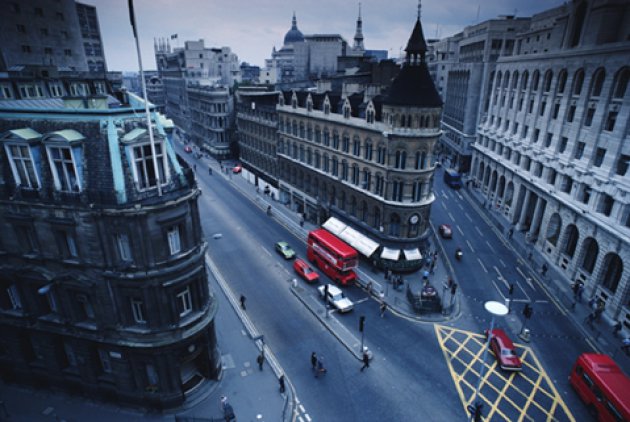How open data will help predict crime
Hi, Habr!
What do open data give humanity? This year they helped recreate Denmark in Minecraft - an interesting achievement, but hardly meaningful for a simple man in the street. The data allows you to compare cities according to certain parameters, to find out people's opinions about them (by unloading the same tweets with geolocation), to learn about the movement of people (data from navigation services), after which they can be used to improve lives - for example, to reduce the load on roads.
I heard an interesting study yesterday at one event: after analyzing the movement of cars in Moscow, the development team of the platform for such an analysis found that new highways in this city would not solve the problem of traffic jams. Because as people move around the city, it is absolutely chaotic, so to eliminate the problem it is necessary to build “capillary” road networks. On the other hand, in the Moscow region, everyone is moving along the main roads.
')
This is just one of the practical uses of open data. You can talk for a long time about how this data will help sell something, but I'm interested in the question a little more humanitarian - the issue of improving life, security, and so on.

First you need to remember that we all sacrifice our freedoms in order to get security, shelter, food, convenience and other benefits in return. And now we are sacrificing our personal lives, because each of us is "under the hood" - everyone has a smartphone, everyone is online, and some already have on their hands all sorts of "smart" watches that collect health data. For what? In order to improve your life, for the sake of health. But this rule only works in those cases where you can use the received data correctly.
At the University of Trento in Italy, they conducted an experiment called “Once Upon a Crime” . Under the link you can find a page with the results of the study and download them in PDF.
The researchers combined open demographic data, of course, anonymous, and data from mobile phones with real data on crimes in London.
For a start, only demographic and crime data was used. Thus, the algorithm has already been able to predict the most "bad" points, that is, the places where a crime may occur next month, with a probability of about 62%.
Then, data from phones was added to this data, which led to an improvement in the algorithm to 68%. Although it is only 6%, but still important.
What else is important: some of the data obtained from the phones turned out to be more significant than the rest. For example, it strongly influences the possibility of committing a crime, whether the user of the phone is at home or on the street. IPhone, for example, is already able to understand whether the person is at home or at work, which will simplify the work of the "soothsayers."

To understand whether it is possible to predict where exactly in London a crime will occur. Predict these offenses so that they can be prevented by properly allocating human and technical resources.
Crime data, statistics are not regularly updated. On the other hand, the mobile operator is able to track the geolocation of the phones in real time along with all the data about their owners - that is, age, field, and so on.
Italian scientists believe that their algorithm reveals how high the chances of committing a crime in a particular area (city area, if you will) are almost 70% of the time.

The predictions of the level shown in the “Dissenting Opinion” are still very far away, and even that “level” had an error. It’s impossible to say what time and where the police have to go in order to take the criminal with absolute certainty.
All that offers this algorithm is to identify the most dangerous areas, as well as the time in which they are most dangerous, to spend budget funds to improve the situation: for example, to install surveillance cameras, to increase or decrease the number of police officers patrolling the area under investigation.
Thus, the use of open data and data on crimes can improve the effectiveness of the fight against crime.
But the question again arises: is the person ready to sacrifice his personal life for this?
What do open data give humanity? This year they helped recreate Denmark in Minecraft - an interesting achievement, but hardly meaningful for a simple man in the street. The data allows you to compare cities according to certain parameters, to find out people's opinions about them (by unloading the same tweets with geolocation), to learn about the movement of people (data from navigation services), after which they can be used to improve lives - for example, to reduce the load on roads.
I heard an interesting study yesterday at one event: after analyzing the movement of cars in Moscow, the development team of the platform for such an analysis found that new highways in this city would not solve the problem of traffic jams. Because as people move around the city, it is absolutely chaotic, so to eliminate the problem it is necessary to build “capillary” road networks. On the other hand, in the Moscow region, everyone is moving along the main roads.
')
This is just one of the practical uses of open data. You can talk for a long time about how this data will help sell something, but I'm interested in the question a little more humanitarian - the issue of improving life, security, and so on.

First you need to remember that we all sacrifice our freedoms in order to get security, shelter, food, convenience and other benefits in return. And now we are sacrificing our personal lives, because each of us is "under the hood" - everyone has a smartphone, everyone is online, and some already have on their hands all sorts of "smart" watches that collect health data. For what? In order to improve your life, for the sake of health. But this rule only works in those cases where you can use the received data correctly.
At the University of Trento in Italy, they conducted an experiment called “Once Upon a Crime” . Under the link you can find a page with the results of the study and download them in PDF.
What they were doing?
The researchers combined open demographic data, of course, anonymous, and data from mobile phones with real data on crimes in London.
For a start, only demographic and crime data was used. Thus, the algorithm has already been able to predict the most "bad" points, that is, the places where a crime may occur next month, with a probability of about 62%.
Then, data from phones was added to this data, which led to an improvement in the algorithm to 68%. Although it is only 6%, but still important.
What else is important: some of the data obtained from the phones turned out to be more significant than the rest. For example, it strongly influences the possibility of committing a crime, whether the user of the phone is at home or on the street. IPhone, for example, is already able to understand whether the person is at home or at work, which will simplify the work of the "soothsayers."

Why is this?
To understand whether it is possible to predict where exactly in London a crime will occur. Predict these offenses so that they can be prevented by properly allocating human and technical resources.
What are the problems with the study?
Crime data, statistics are not regularly updated. On the other hand, the mobile operator is able to track the geolocation of the phones in real time along with all the data about their owners - that is, age, field, and so on.
How accurate are the results?
Italian scientists believe that their algorithm reveals how high the chances of committing a crime in a particular area (city area, if you will) are almost 70% of the time.

How to use them?
The predictions of the level shown in the “Dissenting Opinion” are still very far away, and even that “level” had an error. It’s impossible to say what time and where the police have to go in order to take the criminal with absolute certainty.
All that offers this algorithm is to identify the most dangerous areas, as well as the time in which they are most dangerous, to spend budget funds to improve the situation: for example, to install surveillance cameras, to increase or decrease the number of police officers patrolling the area under investigation.
Thus, the use of open data and data on crimes can improve the effectiveness of the fight against crime.
But the question again arises: is the person ready to sacrifice his personal life for this?
Source: https://habr.com/ru/post/237649/
All Articles